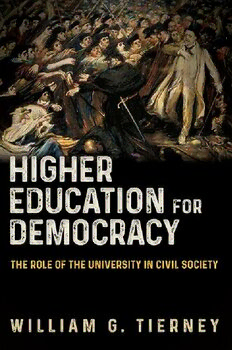
Higher Education for Democracy: The Role of the University in Civil Society PDF
Preview Higher Education for Democracy: The Role of the University in Civil Society
HIGHER EDUCATION FOR DEMOCRACY HIGHER EDUCATION FOR DEMOCRACY The Role of the University in Civil Society WILLIAM G. TIERNEY Cover image: Zola aux outrages by Henry de Groux, 1898. Published by State University of New York Press, Albany © 2021 State University of New York All rights reserved Printed in the United States of America No part of this book may be used or reproduced in any manner whatsoever without written permission. No part of this book may be stored in a retrieval system or transmitted in any form or by any means including electronic, electrostatic, magnetic tape, mechanical, photocopying, recording, or otherwise without the prior permission in writing of the publisher. For information, contact State University of New York Press, Albany, NY www.sunypress.edu Library of Congress Cataloging-in-Publication Data Name: Tierney, William G., author. Title: Higher education for democracy : the role of the university in civil society / William G. Tierney. Description: Albany : State University of New York Press, 2021. | Includes bibliographical references and index. Identifiers: LCCN 2020041500 | ISBN 9781438484495 (hardcover : alk. paper) | ISBN 9781438484518 (ebook) Subjects: LCSH: Education, Higher—Political aspects. | Education, Higher—Aims and objectives. | Universities and colleges—Political aspects. | Democracy and education. | Civil society. Classification: LCC LC171 .T54 2021 | DDC 378.1—dc23 LC record available at https://lccn.loc.gov/2020041500 10 9 8 7 6 5 4 3 2 1 Contents Acknowledgments vii Preface ix 1 Globalization, Neoliberalism, and Their Discontents 1 2 The Democratic Imperative of Higher Education 25 3 Identity Matters 71 4 Understanding Academic Freedom and Free Speech on Campus 97 5 Understanding What Modern Universities Do: Goods and Services 147 6 Academic Competencies for the Twenty-First Century 183 7 Academic Responsibility: Toward a Cultural Politics of Integrity 217 Notes 267 References 269 Index 291 Acknowledgments I am grateful to the support I have received from the Pullias Center for Higher Education at the University of Southern California. My students, research assistants, postdoctoral students, and colleagues helped me think through what I present here. Monica Raad and Diane Flores, who staff the Center for us, are the absolute best at what they do. Although many individuals read a part of this book, Michael Lanford provided extraordi- nary help in his editing and feedback. He’s a gem. Rebecca Colesworthy at SUNY Press has been thoughtful, positive, fun, and reflective about how to improve the text; I’ve been very lucky to work with her. I had the good fortune to put the finishing touches on this manuscript first at the Rockefeller Foundation’s Bellagio Center in Lake Como, Italy, and then at the European University Institute in Florence, Italy, before the pandemic closed down the world. I could not have had better environments to complete this book. Through it all, Barry Weiss has been my sounding board and best friend. vii Preface When I speak to my students about the relatively leisurely times I had when I went to college it seems like I am referring to a foreign land about which they have no knowledge. Today seems entirely different from yesterday. One point I make in this text, however, is that the past and present help determine the future; there is no linear inevitability. I started the book before COVID-19 arrived on the scene and closed down the world. Moreover, although I have long supported Black Lives Matter, the murder of George Floyd created a new urgency for me to think through what I am writing here. We are always in a time of change, and the contexts in which we exist matter a great deal. What I resist, however, is those who say, “Everything must change” as if there is an abrupt rupture from today to tomorrow. Such an assumption is historically naïve, and frequently enables antidem- ocratic forces to constrict the public good. Given the fiscal challenges the pandemic has created, we hear, for example, that the end of academe as we know it is near. However, for over a generation, when higher education has faced a crisis, such a response has been inevitable. Tech boosters now say that an online revolution is about to happen, which will disrupt all of academe. Online learning certainly has grown over the last decade, and some students seem to learn just fine that way. However, I do not find the argument that all our colleges and universities are going to fold like a house of cards very convincing. Clayton Christen- son, and before him, Peter Drucker, have been academic Jeremiahs saying, “The end is near,” Drucker suggested the end of higher education in 1997, and since 2011 Christenson has predicted that half of higher education will go out of business. It has not happened, however. Even today, when academe faces the worst economic crisis in a century because of the pan- demic, sober predictions are that about 5% of the 4,000 postsecondary ix
